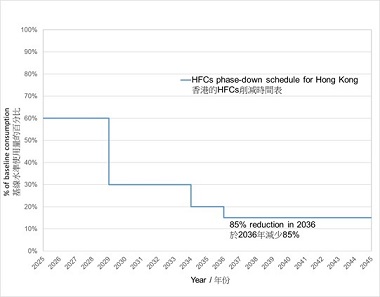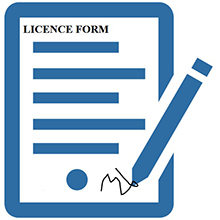Ozone Layer Protection and Combat Climate Change
To protect the ozone layer and shield us from the harmful ultraviolet rays of the Sun, the Montreal Protocol, signed by the international community in 1987, adopted various measures to phase out the production and use of ozone-depleting substances (ODS) which were commonly used as cooling agents for refrigerators and air-conditioners, and fire suppressants. It has been remarkably successful in shrinking the ozone hole over Antarctica.
The ODS were mostly replaced by alternatives, especially hydrofluorocarbons (HFCs). While HFCs do not deplete the ozone layer, they are potent greenhouse gases and contribute significantly to climate change. To address this, the parties to the Montreal Protocol adopted the Kigali Amendment in 2016 to regulate HFCs.
Following the acceptance of the Kigali Amendment by the Central People's Government in 2021, Hong Kong amended the Ozone Layer Protection Ordinance (Cap 403) to include HFCs as scheduled substances in April 2025, and has established control measures to fulfil its international obligations.
Hong Kong’s Phase-down Schedule for HFCs
The control measures regulate the overall production and consumption of HFCs in Hong Kong by prohibiting production and implementing an import/export licensing and quota system, with effect from 1 December 2025.
Hong Kong is required to follow the phase-down timetable of the Kigali Amendment, with the aim of reducing the consumption of HFCs by 85% from the baseline level by 2036.

Ozone Layer Protection Ordinance and Licensing Control
The Ozone Layer Protection Ordinance The Ozone Layer Protection Ordinance applies quotas and licensing restrictions to the import and export of hydrofluorocarbons and ozone depleting chemicals. Importers of the scheduled substances listed in the Schedule to the Ordinance must register with the Environmental Protection Department before applying for a licence to receive those chemicals.
The Ozone Layer Protection Ordinance applies quotas and licensing restrictions to the import and export of hydrofluorocarbons and ozone depleting chemicals. Importers of the scheduled substances listed in the Schedule to the Ordinance must register with the Environmental Protection Department before applying for a licence to receive those chemicals.
What You Can Do
Although most hydrofluorocarbons (HFCs) are used in industry and commerce, what you do at home can still make a difference. The most effective way of combating climate change is to reduce using HFCs. You can do this by:
- regularly inspecting and maintaining your air-conditioners and refrigeration appliances to minimise refrigerant leaks;
- recovering and recycling instead of venting refrigerants containing HFCs in air-conditioners and refrigeration appliances when they are serviced; and
- replacing and retrofitting such equipment to operate on environmental-friendly refrigerants.
Together we can make a difference.